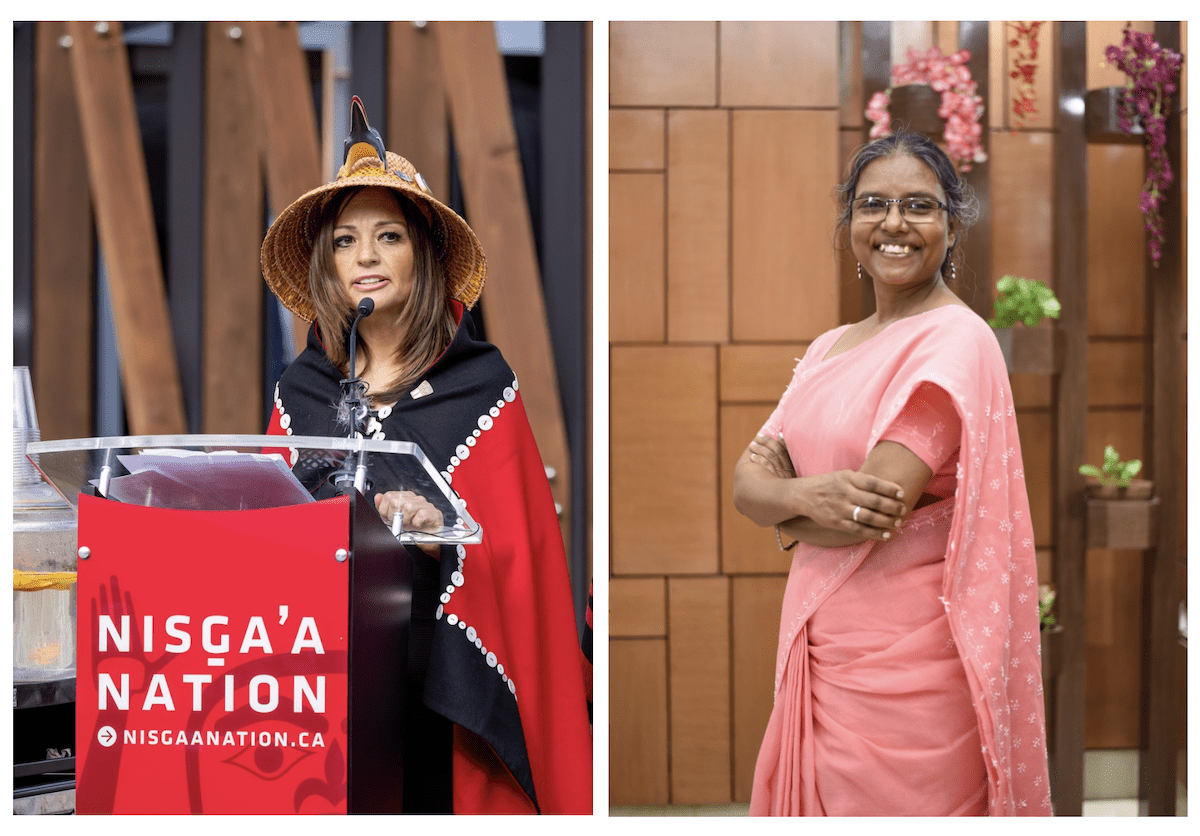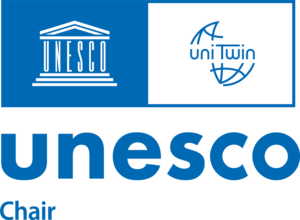Dr. Amy Parent, Dr. Sonajharia Minz appointed UNESCO Co-chairs
to advance Indigenous rights, knowledge systems,and self-determination
Groundbreaking collaboration will uplift Indigenous
communities through decolonized approaches at a global scale
Leading scholars Dr. Amy Parent from the Nisga’a Nation and Dr. Sonajharia Minz of the Oraon Tribal Peoples have been jointly appointed the UNESCO Chair in Transforming Indigenous Knowledge Research Governance and Rematriation. Hosted at Simon Fraser University (Vancouver) in collaboration with Jawaharlal Nehru University (New Delhi), this vital role focuses on uplifting Indigenous communities in Canada, India, and beyond by strengthening their right to self-determination and research governance, while using gender inclusive methods and advanced technologies.
A UNESCO Chair is an academic position established at a university or research institution in partnership with UNESCO to promote international collaboration, knowledge exchange, and capacity-building in areas aligned with UNESCO’s priorities — such as education, cultural heritage, sustainability, and human rights. Each Chair brings together researchers, educators, and communities to advance interdisciplinary work and address global challenges through research, training, and policy development. The program is part of the UNITWIN/UNESCO Chairs Programme, which supports over 1,000 Chairs in more than 125 countries.
Indigenous knowledge research governance (IKRG) refers to the self-determined, Indigenous-led processes, policies, and structures that guide and oversee research involving Indigenous Peoples, including rights, knowledges, languages, and lands. IKRG represents a transformative approach that is not only deeply rooted in Indigenous principles of respect, reciprocity, and responsibility towards Mother Earth and all living beings, but also calls for the inclusion of gender sensitive approaches to challenge gender violence, oppression, and research colonialism.
“It is still far too uncommon to see Indigenous women leading international initiatives like this,” says Parent. “Dr. Sonajharia Minz and I carry this joint appointment not only with deep honour, but with a profound sense of responsibility — to our Nations, our Ancestors, and the generations to come. We are committed to bringing forward the strength of our Nations and the integrity of our knowledge systems into spaces and places where they have long been excluded. We are also taking our next step with rematriation, and this announcement is about more than just a title — it’s about inviting others to dream with us, and to know that yes, we can do this work, together. We want Indigenous matriarchs, Knowledge Keepers, youth, rightsholders, and communities to know that this Chair is for all of us.”
Minz adds: “Time is running out — we are on the brink of losing Indigenous languages around the world, and language is more than a mere communication tool. Indigenous languages are a repository of culture, knowledge, and knowledge systems. They are awaiting urgent attention for revitalization, which means that we are all endowed with the responsibility to preserve these worldviews for our future generations.”
Parent and Minz hold expertise in transdisciplinary fields including education, governance, computer science, artificial intelligence, and language revitalization. Parent says, “We are thrilled with this opportunity to continue catalyzing systemic transformation and undertake deeper responsibilities with Indigenous Peoples around the world in an Indigenous knowledge-centred, matriarchal driven, and technologically advanced manner.”
Over the next four years, the term of the Chair appointment, Parent and Minz will focus on outreach and relationship-building with local, national, and international Indigenous communities, organizations, and Nations. Their work will support Indigenous-led processes for returning cultural belongings, developing distinctions-based models of research governance, and co-creating policy pathways for Indigenous language revitalization. They will also contribute to the design of decentralized digital infrastructure and advance Indigenous-governed approaches to artificial intelligence and data sovereignty. Through both their living example and active mentorship, they aim to strengthen Indigenous matriarchal values of promoting, protecting, preserving, and passing on of Indigenous knowledges.
Parent and Minz will be joining other Indigenous representatives in the network, alongside the current UNESCO Chair in the Transmission of First Peoples’ Culture to Foster Well-Being and Empowerment at the University of Quebec at Chicoutimi, and the UNESCO Chair in Indigenous Protected and Conserved Areas: Research and Action at Vancouver Island University.
A launch of the appointment with publicly witnessing will be held during the B.C. First Nations Women’s, 2SLGBTQQIA+, Self-Determination & Rematriation Research Governance Summit on Oct. 20, 2025, on Coast Salish Territories.
About Dr. Amy Parent
Dr. Amy Parent’s Nisga’a name is Noxs Ts’aawit (Mother of the Raven Warrior Chief named Ts’awit). On her mother’s side of the family, she is from the House of Ni’isjoohl and is a member of the Ganada (frog) clan in the Village of Laxgalts’ap in the the Nisga’a Nation. On her father’s side of the family, she is of Settler ancestry (French and German). Dr. Parent is a scholar, speaker, mentor, educator, and mother. She is an Associate Professor and Canada Research Chair in Indigenous Education & Governance (Tier 2) in the Faculty of Education at Simon Fraser University (Ph.D., UBC). She is also Co-Chair of the Indigenous Research Leadership Circle with the Tri-Council Agency (Canadian Institutes of Health Research, Natural Sciences and Engineering Research Council, and Social Sciences and Humanities Research Council) and the Inaugural Associate Director for the SFU Cassidy Centre for Educational Justice. In 2023, she received the B.C. Historical Foundation Certificate of Merit with the N’isjoohl rematriation delegation team, which recognized our collective work in bringing our family’s memorial pole back to its rightful place in the Nisga’a Nation after being stolen for 94 years. In 2024, she was named the Confederation of University Faculty Associations of British Columbia “Distinguished Academic of the Year.”
About Dr. Sonajharia Minz
Dr. Sonajharia Minz comes from Oraon tribe from Jharkhand, India. Her mother tongue is Kurukh. Minz (a fish) is the totem of her clan. Her mother came from Khess (Paddy) clan and her husband hails from Ekka (Turtle) clan of the Oraons. Approximately 3.6 million Oraons are found in the Indian state of Jharkhand, Chattisgarh, West Bengal, Odisha, Madhya Pradesh, Maharashtra and Bihar of which 1.7 million are in Jharkhand. Oraon is the second largest tribe in Jharkhand after the Santal tribe. With Mathematics and Computer Science as her graduate and doctoral studies Dr. Minz is a Professor of Computer Science at the Jawaharlal Nehru University, New Delhi, India. Her research areas include Spatial Data Analytics and Geospatial Informatics using Artificial Intelligence and Machine Learning. Dr. Minz was previously the Vice Chancellor of Sido Kanhu Murmu University, a public university in Jharkhand. She is a CoPI of the international project Gender-oriented Adaptive cross-Learning climate change adaptation and disaster risk resilience funded in 2023 by Asia Pacific Network. Dr. Minz is a scholar, writer and speaker on matters of gender justice, social justice, tribal languages and culture.
Media release provided by Ines Image of Dr. Amy Parent (left) photo credit: Red Bike Media Image of Dr. Sonajharia Minz (right) photo credit: Balkishor Tudu



Congratulation to you Mam and wish you all the best for your next mission.